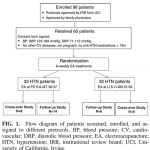hypertension
Wikimedia, Whatiguana
Preeclampsia is a serious complication that develops in about 5-8% of pregnant women. It is characterized by elevated blood pressure and is typically accompanied by excess protein in the urine (a sign of kidney problems). Symptoms often (but not always) return to normal after delivery of the baby.
Elabela is a recently discovered micropeptide secreted by the placenta in mammals. It is also found in fish where it plays a role in development of the heart. A recent study published in Science showed that mice that do not have this…
Photo of an African Green Monkey by Sharp Photography, via Wikimedia Commons
Humans are not the only primates that spontaneously develop hypertension. A new study published in the American Journal of Physiology - Regulatory, Integrative and Comparative Physiology, examined the development of spontaneous hypertension in African Green Monkeys (Chlorocebus aethiops sabaeus; aka: vervets). The team measured blood pressure in 424 adult monkeys and found that 37% had high blood pressure (SBP: 172.0±2.2 mmHg) and an additional 18% had borderline hypertension. Like humans, the prevalence of…
The Michigan Physiological Society, a chapter of the American Physiological Society, held their 3rd annual meeting last week. As mentioned in a prior post, the keynote address was given by Comparative Physiologist Dr. Hannah Carey (University of Wisconsin School of Veterinary Medicine). You can read about her research in the prior post.
Here are other highlights from the meeting:
Seminars:
Photo of crayfish by "Krebse in Österreich", own work, CC BY 2.0, https://commons.wikimedia.org/w/index.php?curid=858592
...or as I prefer to view them:
Image of crayfish dinner By Игоревич (Own…
This is a great month for Physiology! Several of the local chapters of the American Physiological Society (APS) are having their annual meetings.
The Nebraska Physiological Society met this past weekend at the University of South Dakota, Sanford School of Medicine. Here are the highlights from their meeting:
Dr. Bill Yates, Professor from the University of Pittsburgh School of Medicine gave the APS sponsored keynote address on “Multisensory Control of Blood Pressure.” His research is focused on understanding the link between our vestibular system and blood pressure…
Acupuncture is a theatrical placebo, but it's hard not to grudgingly admire just how—shall we say?—malleable or adaptable a placebo it is. What I mean by this is that, if you believe its practitioners and adherents, acupuncture can treat almost literally any disease or health problem. Any! Pain? Acupuncture. Allergies? Acupuncture. Biliary colic? Acupuncture. Infertility? Acupuncture. Menstrual problems? Acupuncture. Prostate problems? Acupuncture. Asthma? Acupuncture.
Well, maybe not asthma, but that doesn't stop acupuncturists from claiming that acupuncture can treat it.
Oh, and if you're a…
Image of a grizzly bear at Yellowstone National Park from http://free-naturewallpaper.com/nature-images/animals/bears/Grizzly-at-…
I was so excited to see a story featuring grizzly bears (Ursus arctos horribilis) in the Wall Street Journal yesterday. The article was about how Dr. Kevin Corbit at Amgen Inc. is studying grizzly bears in the Bear Center at Washington State University to learn more about obesity. The 12 animals living in the facility were either rescued from places where they were captured after getting too close to humans or were born at the facility. Dr. Corbit was quoted in…
Image by He Meng, from Nature News
Bactrian camels thrive in conditions considered harsh by many standards: very dry, cold, high elevations. Researchers now suspect their physiological adaptations of high blood sugar, high salt diets, and increased body fat may have evolved to help the animals cope with their environment. For humans, those symptoms could lead to heart disease, but for the Bactrian camel, they are considered physiological, i.e. totally normal.
A paper published in Nature Communications describes the genomic variations in wild and domesticated Bactrian camels. What they…
I'm a primary care physician. What I, other internists, pediatricians, and family medicine docs do is prevent and treat common diseases. When we get to diseases that require more specialized care, we refer to our specialist colleagues. There is a movement afoot to broaden the role of naturopaths to make them primary care doctors. The big difference between naturopaths and real primary care physicians (PCPs) is that naturopaths haven't gone to medical school, completed a post-graduate residency program, and taken their specialty boards. Why is this important? If a naturopath wants to be…


